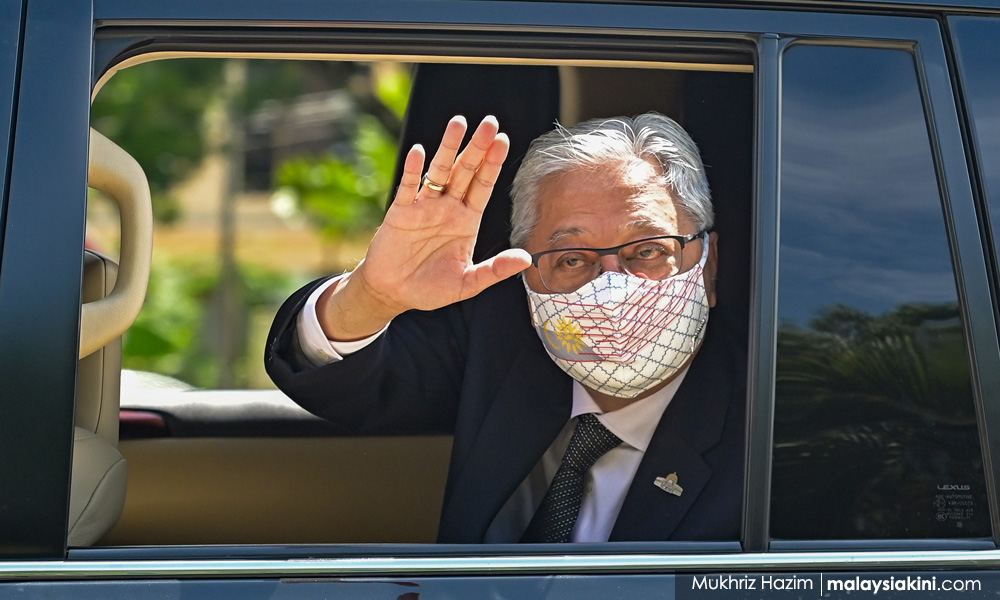Decades from now, when people read about Ismail Sabri Yaakob’s biography, they would think that his premiership was scripted. His political career was orderly, progressing smoothly almost without a blip, as though his ascendency was predestined and calculated.
At 25, Ismail Sabri did what any ambitious young man would do. He began his career as a lawyer (as did all prime ministers of his time) while getting involved in the Umno Temerloh division.
He served as the information chief, then youth chief, deputy chief and eventually the Umno Bera chief in an expected 15 years.
Before running as an MP, Ismail Sabri took the expected political route, by working as a political secretary to a minister, and serving agencies like Pahang Tenggara Board, Malaysian Tourism Promotion Board and the National Sports Complex to get his administrative training like most Umno leaders.
A term after he was elected MP, he started serving junior portfolios in government like the youth and sports minister and the domestic trade and consumer affairs minister, before ascending to portfolios that could consolidate Umno’s stranglehold by becoming the agriculture and food industries minister and subsequently rural and regional development minister.
These two ministerships were regarded as particularly important to Umno because of the concentration of their voter base and the leverage of large-scale government contracts.
Two competing theories
While 2018 devastated Umno as a party, Ismail Sabri’s fortunes were drastically different. He was elected the top vice-president in Umno, before taking over two overlooked roles of opposition leader in Parliament and acting deputy president in Umno, providing him unprecedented access, resources and respect.
Ismail Sabri was also the best neutralising tool for Bersatu, an unthreatening face to the highest portfolios, including the defence minister, senior minister (security), and the deputy prime minister.
Eventually, Ismail Sabri was the best compromise candidate for prime minister. All parties within Perikatan Nasional do not hold grudges against him, and everyone feels like they could extract something from him.
Unremarkable and uncontroversial, Ismail Sabri was quiet about his ambitions while he enjoys the uninhibited progress on the political ladder.
This background is important in understanding how Ismail Sabri’s premiership may play out. There are two competing theories on what he would do next, one based on the unique circumstances surrounding his premiership, and another based on his proven background.

What is widely agreed is that Ismail Sabri would, in all likelihood, be the shortest-serving prime minister in history. Holding an election is first on the agenda for Umno and PN after the Covid-19 subsides.
In all honesty, even Ismail Sabri knows that his premiership was a fluke and would probably not happen again in the next general election. That also means that Ismail Sabri does not have much to lose.
His party, Umno, would also not withdraw support the way they did for Muhyiddin Yassin, as they would appear greedy, unreasonable and unpopular. At a time of intense political polarisation, the king, the opposition and the public are also on Ismail Sabri’s side to cooperate for his success.
For the first time, Ismail Sabri could finally not care about the next election and focus on his personal legacy. He is prime minister; there is no place higher.
However, this theory relies heavily on the unique circumstances that surround Ismail Sabri. It does not account for Ismail Sabri as a person.
Political template of safety
The second theory, therefore, accounts for the extremely conservative choices he has made in the past. He would likely prioritise uncontroversial tasks, rather than going out with a bang.
He is not an inspiring, charismatic or decisive leader. Conservatism and safety were the philosophy that served his 40-year political career well, and it is unlikely that he would suddenly change - unless he is the closet reformist we never knew.
His recent cabinet appointments and the postponement of parliamentary sittings are evidence of the conservative and safe choices Ismail Sabri would make.
The marginal and cosmetic changes to his cabinet appointment proved uncreative; carrying on Muhyiddin’s legacy of replacing one deputy prime minister with four senior ministers is the epitome of kicking the can down the road.
That means the reconciliation and cooperation with the opposition would also be a limited affair. Ismail Sabri has already cautioned against a unity government idea, and he would likely make little to no progress in appointing more opposition members into key parliamentary or government roles to properly reform and reset.
Having meetings and discussions across the aisle are probably the furthest Ismail Sabri is willing to go.
That is why the opposition ought to still have their guards up in dealing with Ismail Sabri’s government. Cooperate and work together so our country’s health and the economy would heal, but do not stop criticising the shortcomings of his legacy administration.
Ismail Sabri is not a radical – he would not run away from the political script that has served his political career well all these years. - Mkini
JAMES CHAI is a political analyst. He also blogs at www.jameschai.com.my and he can be reached at jameschai.mpuk@gmail.com.
The views expressed here are those of the author/contributor and do not necessarily represent the views of MMKtT.

No comments:
Post a Comment
Note: Only a member of this blog may post a comment.